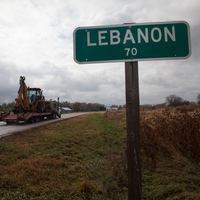
Aug 20, 2020
This is a story of a road trip. After a particularly traumatic Valentine's Day, Fadi Boukaram was surfing google maps and noticed that there was a town called Lebanon... in Oregon. Being Lebanese himself, he wondered, how many Lebanons exist in the US? The answer: 47. Thus began his journey to visit them all and find an America he'd never expected, and the homeland he'd been searching for all along.
This episode was made in collaboration with Kerning Cultures, a podcast that tells stories from the Middle East and North Africa. The original "Lebanon USA" story was reported by Alex Atack with editorial support from Bella Ibrahim, Dana Ballout, Zeina Dowidar, and Hebah Fisher. Original sound design by Alex Atack.
The new update of the story was produced and reported by Shima Oliaee.
We had original music by Thomas Koner and Jad Atoui.
Be sure to check out Kerning Cultures at their website www.kerningcultures.com, instagram @kerningcultures, or twitter @kerningcultures. You can read more about Fadi’s trips and see his photographs at lebanonusa.com or on his Instagram at @lebanonusa.
Support Radiolab today at Radiolab.org/donate.
Editor's Note: In an earlier version of this episode, we inaccurately described a grain elevator. We have updated the audio to reflect the correction.
---
If you would like to donate to Beirut at this time, we have links here (from NYT):
The Lebanese Red Cross dispatches every ambulance from North Lebanon, Bekaa, and South Lebanon to Beirut to treat the wounded and help in search-and-rescue operations. You can make a contribution here.
The United Nations’ World Food Program provides food to people displaced or made homeless after the blast. Lebanon imports nearly 85% of its food, and the port of Beirut, the epicenter of the explosion, played a central role in that supply chain. With the port now severely damaged, food prices are likely to be beyond the reach of many. You can donate here.
The NGO Humanity and Inclusion has 100 workers in Lebanon, including physical therapists, psychologists and social workers. They are focusing on post-surgical therapy in Beirut following the explosion. You can make a contribution here.
International Medical Corps is deploying medical units and will provide mental health care to those affected in Lebanon. The humanitarian aid organization also provides health services to Syrian refugees in Lebanon, and vulnerable Lebanese. You can donate here.
Islamic Relief, which specializes in food aid and emergency response, is helping to put a supply chain in place for emergency aid in Beirut. You can donate here.
Save the Children have launched a Lebanon’s children relief fund, to which you can donate here.
UNICEF, the United Nations agency specializing in aid to children, is providing medical and vaccine supplies in Beirut, and supplying drinking water to rescue workers at the Beirut port. Its on-the-ground team is also counseling children traumatized by the blast. You can donate here.
Impact Lebanon, a nonprofit organization, has set up a crowdfunding campaign to help organizations on the ground, and is helping to share information about people still missing after the explosion. The group had raised over $3 million as of Wednesday and donated the first $100,000 to the Lebanese Red Cross.
The health care organization Project HOPE is bringing medical supplies and protective gear to Beirut and assisting the authorities on the ground. A donation page is available here.
Over 300,000 people in Beirut were displaced from their homes by the explosion. Baytna Baytak, a charity that provided free housing to health care workers during the coronavirus pandemic, is now raising funds with Impact Lebanon to shelter those who have been displaced.
For those in Beirut, here is a list of urgent blood needs. Several social media accounts have also been set up to help locate victims.